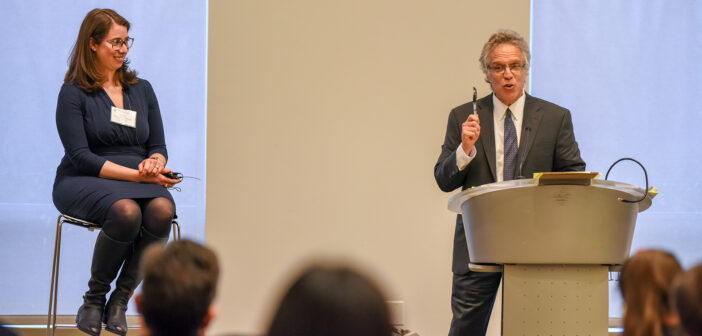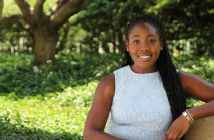The Center for Judicial Events and Clerkships (CJEC) welcomed U.S. Circuit Court Judge Stephen Higginson of the U.S. Court of Appeals for the Fifth Circuit to Fordham Law as its Spring 2022 Jurist in Residence. The highly anticipated visit marked the physical return of a popular CJEC program at Fordham Law School.
Prior to joining the court in 2011, Judge Higginson clerked for the late Chief Judge Patricia M. Wald on the United States Court of Appeals for District of Columbia Circuit as well as for the late Justice Byron White on the United States Supreme Court. He later served as an assistant U.S. attorney in both Massachusetts and Louisiana (where he also became chief of appeals) and was an associate professor at Loyola University New Orleans College of Law.
During the week of March 21, Judge Higginson was engaged in all aspects of the life of Fordham Law, including hosting a small roundtable discussion with students, co-teaching classes in both constitutional law and evidence, and attending lunches and receptions with Fordham Law faculty, staff, and students.
“Judge Higginson is one of the finest Court of Appeals judges in the country, and his participation at Fordham has been energizing and exciting,” said Daniel J. Capra, Reed Professor of Law and CJEC faculty director, who provided opening marks for Judge Higginson’s formal Jurist in Residence lecture on March 24 and facilitated a Q&A with the audience at the end of the program.
“‘Curious Judge’ Seeks Law Student Advice”
 Judge Higginson capped off his visit at Fordham Law with a lecture that explored his viewpoints on dilemmas he contemplates while serving on the bench, including judicial philosophy; the role of scholarship in the law; the role of law clerks, affiliations and memberships; and dissenting opinions. The lecture, titled “Judicial Dilemmas After Ten Years on the Bench: ‘Curious Judge’ Seeks Law Student Advice,” provided attendees with thoughtful lessons and questions to ponder as they continue their law school journeys and venture out into the legal field. Judge Higginson also spoke about the power of strong, creative lawyering and strategic dissents, both of which have the power to help shape our future.
Judge Higginson capped off his visit at Fordham Law with a lecture that explored his viewpoints on dilemmas he contemplates while serving on the bench, including judicial philosophy; the role of scholarship in the law; the role of law clerks, affiliations and memberships; and dissenting opinions. The lecture, titled “Judicial Dilemmas After Ten Years on the Bench: ‘Curious Judge’ Seeks Law Student Advice,” provided attendees with thoughtful lessons and questions to ponder as they continue their law school journeys and venture out into the legal field. Judge Higginson also spoke about the power of strong, creative lawyering and strategic dissents, both of which have the power to help shape our future.
“A beautiful truth is that legal scholarship in America has an immense influence on what we [judges]do,” said Judge Higginson. “I don’t think the appellate rules—certainly not the evidence rules—have caught up with how scholars are sneaking into opinions. Professors wield a lot of power that they don’t fully realize they have.”
In terms of the role law clerks generally play, Judge Higginson told the audience—primarily composed of Fordham Law students—that they should always be confident. “You are ready to be outstanding and you all could be superb law clerks,” he said. “You will have the passion, the brains, and you could do any job out there.”
“The biggest role a law clerk often plays is communicating to all three judges [on the appellate panel]through your recommendation,” he added. “That bench memo you write … is a lot of responsibility. It doesn’t help me when law clerks are shy. I want them to give me a recommendation and then I’ll start testing propositions in discussions and getting down to the kernel of inquiry I have.”
Judge Higginson also gave practical advice about how law clerks can best prepare a bench memorandum. “Finish what you’re going to submit to court a week early, leave yourself time to rewrite, and always have someone else read it. There’s no such thing as good writing—just good rewriting,” he said. “I also believe oral read backs are great, which I do in my chambers. You can catch errors that you might not see when just reading.”
Kelsey Ruescher-Enkeboll, who served as one of Judge Higginson’s law clerks the prior year, joined the judge on stage to offer her perspective on working alongside him.
“Judge Higginson is very committed to neutrality,” said Ruescher-Enkeboll, who now clerks for Judge Rowan D. Wilson on the New York Court of Appeals. “Working with Jude Higginson really gave me a lot of faith in how the Constitution is upheld [in the judicial system].”
Students Reflect on Judge Higginson’s Visit
Following the lecture, Judge Higginson joined those in attendance for a reception, where he further discussed points raised in his lecture and his career path to the bench.
“In addition to hearing Judge Higginson speak in our evening evidence class with Professor Capra, I was fortunate to also attend the small luncheon with Judge Higginson and, later, his talk,” said Sarah Seo ’23. “At the lunch, Judge Higginson was eager to hear every single voice in the room and provided insightful advice on all things law school, clerkship, and practice.”
 “I deeply admire Judge Higginson for his passion for the law and genuine excitement for pressing legal issues, and I am grateful to both Professor Capra and Dean Endrizzi for inviting Judge Higginson to share his words of wisdom with the law students and faculty at Fordham,” Seo added.
“I deeply admire Judge Higginson for his passion for the law and genuine excitement for pressing legal issues, and I am grateful to both Professor Capra and Dean Endrizzi for inviting Judge Higginson to share his words of wisdom with the law students and faculty at Fordham,” Seo added.
“Judge Higginson pulled no punches in bringing to the surface several of the most fraught tensions within the enterprise of judicial decision making,” said Alexander Breindel ’23. “Regarding his visit as a whole, I think Judge Higginson’s focus on the advocate’s role in lawmaking served as a clarion call to all the soon-to-be lawyers in the room, [who are]eager to make an impact.”
As the CJEC rounds off its third academic year, it continues to build upon the goals and efforts of its inaugural year in 2019 by developing initiatives and offering opportunities that engage members of the judiciary with the Fordham Law community.





